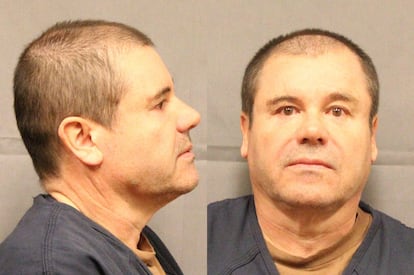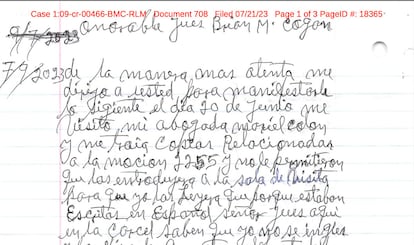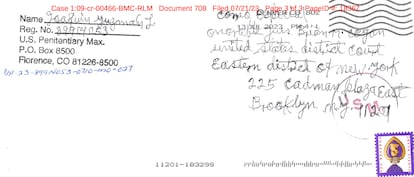Mexican drug kingpin ‘El Chapo’ accuses prison officials of violating his rights
Serving a life sentence in the United States, the former cartel boss wrote a letter to a judge complaining about the lack of access to critical documents for his case

“A grave injustice and a flagrant disregard for human rights.” These were the words of Joaquín “El Chapo” Guzmán as he voiced his frustration with the treatment he endures at the maximum security prison in Florence, Colorado, known as the “Rocky Mountain Alcatraz.” Guzmán penned a handwritten letter to Judge Brian Cogan, the same man who sentenced him to life imprisonment in 2019, seeking documents in Spanish pertaining to his case.
Guzmán wrote that his lawyer, Mariel Colón, visited the prison on June 20 to deliver some documents. However, the prison guards refused to let Guzmán have them because the documents were in Spanish. “Your Honor, here in jail, they know that I don’t know English,” he wrote to Cogan. The drug trafficker says he attempts to stay updated on the latest developments in his case using a dictionary.
Guzmán has requested documents related to a 2255 motion, and instrument that allows a prisoner in U.S. custody to seek release if they believe their sentence was imposed in violation of the U.S. Constitution or its laws. “It feels like everything is being done consciously and in bad faith against me,” Guzmán wrote in a letter dated July 9 obtained by Milenio, a major Mexican national newspaper. In the two-page letter seen by EL PAÍS, the cartel boss claims that he is often denied adequate access to his lawyer because he escaped from prison in Mexico. “It’s an absurd excuse they use to justify these irregularities,” he wrote.

“It’s a right that every prisoner has, and they know they are violating it,” claims Guzmán, who is demanding the judge’s intervention so his correspondence is not withheld. Guzmán had previously complained that he had been subjected to “cruel and unfair treatment” ever since he was extradited from Mexico in January 2017. In September 2021, the drug trafficker submitted an affidavit before a U.S. court claiming that his physical health and mental well-being suffered due to the isolation measures imposed on him. “I have suffered a lot... Due to the treatment in ADMAX [the prison where he is serving his sentence], I now suffer from headaches, memory loss, muscle cramps, stress and depression... I have suffered a lot.” In January, Guzmán sent another letter, this time addressed to Mexico’s ambassador to the United States, asking for President Manuel López Obrador’s help in securing his release.
A year ago, an appeals court upheld Guzmán’s conviction. The appeal had claimed that the jury’s decision was biased, as some members had read press releases about Guzmán’s criminal record. It was also contended that the isolation conditions imposed on Guzman prevented him from collaborating with his defense. However, these arguments were deemed invalid by the appeals court. ”Any potential bias paled in comparison to the compelling evidence of Guzmán’s culpability, thereby rendering it harmless,” stated the appeals court ruling.

In June, Emma Coronel, a former beauty queen and Guzmán’s third wife, was released from prison. Coronel spent 15 months in prison for drug trafficking and money laundering, before being allowed to serve the remainder of her three-year sentence under house arrest.
The U.S. justice system launched a new offensive this year against “Los Chapitos,” four of Guzmán’s sons and the heirs to his drug trafficking empire, who were accused of being the main traffickers of fentanyl to the United States. In April, Alfredo, Iván, Joaquín and Ovidio Guzmán, along with 24 cartel collaborators, were charged with organized crime, drug trafficking, illegal possession of weapons and money laundering. Ovidio “El Ratón” Guzmán was arrested in January during a major operation in Culiacán, the capital of the Sinaloa.
“We are not the leaders of the Sinaloa Cartel, nor are we interested in being so,” stated Guzmán’s sons in a letter released in May through their lawyers. They said they were “victims of persecution and had been made scapegoats” due to their father’s notoriety. “We believed that keeping quiet and not bothering anyone would diminish the consequences of the cradle in which we were born,” they said.
“I thank you in advance,” reads the last line of Chapo Guzmán’s latest letter. In January, Judge Brian Cogan will sentence Genaro García Luna, a former security minister under President Felipe Calderón (2006-2012). In February, García Luna, who played a key role in Mexico’s war on drugs, was convicted of drug trafficking, organized crime and making false statements. He was accused of collaborating with the Sinaloa Cartel for over two decades.
Sign up for our weekly newsletter to get more English-language news coverage from EL PAÍS USA Edition
Tu suscripción se está usando en otro dispositivo
¿Quieres añadir otro usuario a tu suscripción?
Si continúas leyendo en este dispositivo, no se podrá leer en el otro.
FlechaTu suscripción se está usando en otro dispositivo y solo puedes acceder a EL PAÍS desde un dispositivo a la vez.
Si quieres compartir tu cuenta, cambia tu suscripción a la modalidad Premium, así podrás añadir otro usuario. Cada uno accederá con su propia cuenta de email, lo que os permitirá personalizar vuestra experiencia en EL PAÍS.
¿Tienes una suscripción de empresa? Accede aquí para contratar más cuentas.
En el caso de no saber quién está usando tu cuenta, te recomendamos cambiar tu contraseña aquí.
Si decides continuar compartiendo tu cuenta, este mensaje se mostrará en tu dispositivo y en el de la otra persona que está usando tu cuenta de forma indefinida, afectando a tu experiencia de lectura. Puedes consultar aquí los términos y condiciones de la suscripción digital.









































